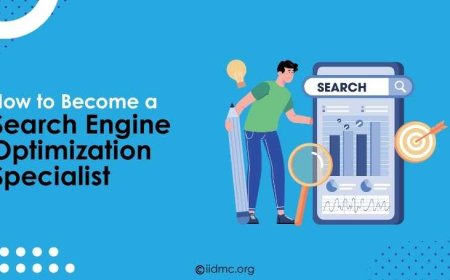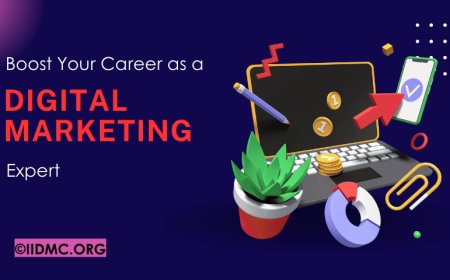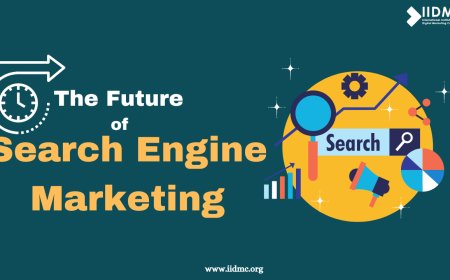Social Media vs Digital: Which to Choose
Learn the key factors to consider when choosing between social media and digital marketing for your business, including goals, target audience, budget, and product type.
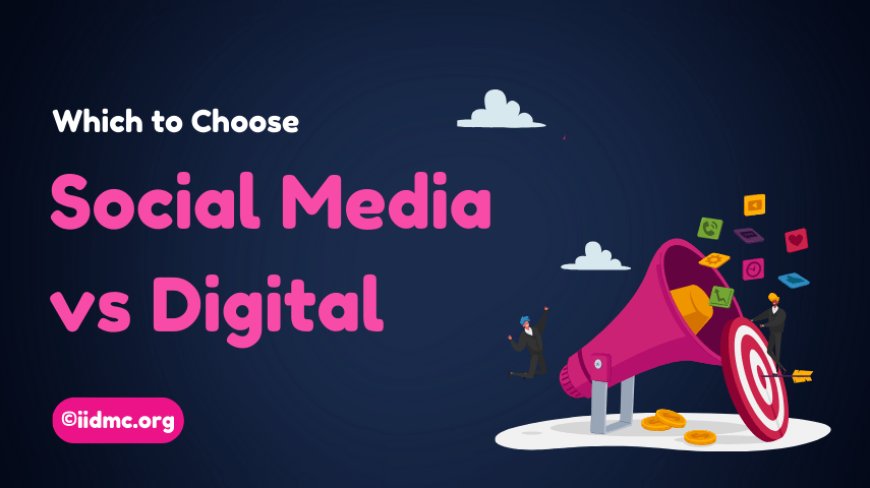
In today’s fast-paced digital world, businesses face a crucial decision: should they invest in social media marketing, digital marketing, or both? While the two terms are often used interchangeably, they represent different strategies that can significantly impact your brand’s visibility, engagement, and overall success. In this blog, we’ll break down the key differences between social media and digital marketing, explore their unique benefits, and help you determine which one – or combination – is best suited for your goals. Whether you're a small business or a seasoned marketer, understanding these nuances is essential for crafting a winning strategy.
Understanding Social Media Marketing
1. What is Social Media Marketing?
Social media marketing refers to the use of social platforms to promote products, services, or brands. It includes creating and sharing content on platforms like Facebook, Instagram, Twitter, LinkedIn, and TikTok to engage audiences and drive results.
2. Key Platforms
The major platforms for social media marketing include:
-
Facebook
-
Instagram
-
Twitter (X)
-
LinkedIn
Each platform offers unique ways to connect with audiences, from posts and stories to videos and live streaming.
Advantages of Social Media Marketing
-
Direct engagement with audiences: Build relationships through real-time interactions.
-
Building community and brand loyalty: Create a loyal following through consistent, engaging content.
-
Cost-effective advertising: Use targeted ads to reach specific demographics with smaller budgets.
-
Viral marketing potential: Content has the potential to go viral and significantly boost brand visibility.
Limitations of Social Media Marketing
-
Requires consistent content creation: Success depends on regular posting and engagement.
-
Algorithm dependency: Organic reach can be limited by platform algorithms, affecting visibility.
-
Platform-specific limitations: Each platform has its own constraints, such as post formats or ad restrictions.
Best Use Cases for Social Media Marketing
-
B2C businesses: Social media marketing excels in reaching direct consumers.
-
Small businesses and personal brands: It's highly effective for building an authentic connection with audiences.
-
Short-term campaigns and product launches: Ideal for generating buzz and excitement quickly.
Understanding Digital Marketing
What is Digital Marketing?
Digital marketing involves promoting products or services through various online channels, including SEO, PPC, email marketing, content marketing, websites, blogs, and search engines.
Advantages of Digital Marketing
-
Multi-channel reach: Extends beyond social media to websites, email, and search engines.
-
Long-term strategies: SEO drives sustained organic growth.
-
Broader analytics: More detailed data collection and insights.
-
Diversified campaigns: Mix of paid ads, organic traffic, and email marketing.
Limitations of Digital Marketing
-
Larger investment: PPC and SEO campaigns can be costly.
-
Slower momentum: Building results may take longer than viral social media.
-
Complex tools: Requires managing multiple platforms and tools.
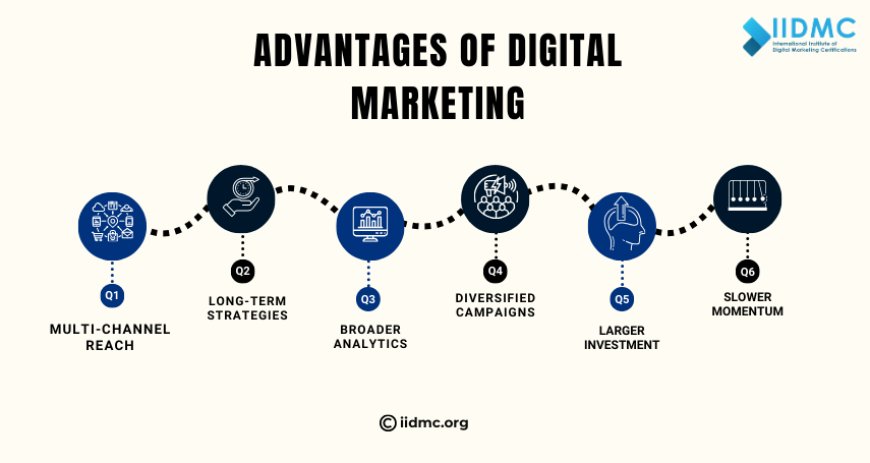
Best Use Cases for Digital Marketing
-
B2B businesses: Perfect for long-term brand building and sustained growth.
-
Lead generation: Effective for capturing high-quality leads and running large-scale campaigns.
Key Differences Between Social Media Marketing and Digital Marketing
Scope and Channels
-
Social Media: Focuses on specific platforms like Facebook, Instagram, etc.
-
Digital Marketing: Encompasses broader channels like websites, SEO, and email.
Audience Engagement
-
Social Media: Direct, real-time engagement with immediate feedback.
-
Digital Marketing: Broader reach, less personal interaction.
Costs and Investment
-
Social Media: Cost-effective but time-consuming, especially for organic growth.
-
Digital Marketing: Higher costs (PPC, SEO), with long-term ROI potential.
Speed and Impact
-
Social Media: Quick impact with short-term campaigns.
-
Digital Marketing: Slower, steady growth with lasting effects.
Factors to Consider When Choosing Between Social Media and Digital Marketing
Business Goals
-
Quick Engagement vs. Long-term Growth:
-
Social media excels in delivering quick engagement through interactions such as likes, comments, and shares. It's ideal for businesses looking to generate buzz or increase visibility quickly.
-
Digital marketing, with strategies like SEO, email marketing, and content marketing, focuses on long-term growth by building brand trust and driving consistent organic traffic over time.
-
Brand Awareness vs. Lead Generation:
-
Social media platforms are highly effective for brand awareness, especially through visual storytelling, influencer partnerships, and user-generated content.
-
Digital marketing techniques like PPC (pay-per-click) ads, email campaigns, and SEO are often more effective for lead generation, focusing on guiding potential customers down the conversion funnel.
Target Audience
-
Social Platforms vs. Broader Web:
-
Identify where your audience spends the most time. If your audience is active on platforms like Instagram, TikTok, or LinkedIn, then social media might be the best channel.
-
If your target audience is broader and uses various digital channels like search engines, industry blogs, or email, a comprehensive digital marketing strategy will likely be more effective.
Budget and Resources
-
Time and Money for Content Creation:
-
Social media often requires continuous content creation and community management. You’ll need resources for creating engaging visuals, stories, videos, and interacting with users.
-
Digital marketing might require higher upfront costs, especially for paid ads, SEO, or web content creation, but it can often be scaled more efficiently over time. Resources may be needed for ad spend, technical SEO audits, or copywriting for long-form content.
Type of Product/Service
-
Visual-Driven Products vs. Niche or Complex Products:
-
If your product is visually appealing (e.g., fashion, food, lifestyle products), social media platforms like Instagram or Pinterest are highly effective due to their emphasis on visuals.
-
If your product is more niche, technical, or requires explanation (e.g., SaaS, B2B solutions), digital marketing strategies like content marketing, webinars, and SEO can be more suitable. These allow for a deeper level of engagement and explanation.
By considering these factors, businesses can determine whether social media, digital marketing, or a combination of both is best suited to their unique objectives and resources.
Combining Social Media and Digital Marketing
1. Integrated Marketing Strategy
Businesses can achieve greater success by combining social media with digital marketing tactics like email, SEO, and PPC for a comprehensive approach.
2. Examples of Integration
-
Use social media to drive traffic to your website, where SEO and PPC can capture leads.
-
Combine email marketing with social campaigns to nurture relationships and boost engagement.
3. Case Study: Successful Businesses Using Both
Look at companies that excel by integrating both strategies, using social media for brand awareness and digital marketing for lead generation and long-term growth.
Social Media Marketing offers quick engagement and real-time interaction, while Digital Marketing provides long-term growth and a broader reach through strategies like SEO and PPC. The right approach depends on your business goals, target audience, and resources, with social media excelling in brand awareness and digital marketing focusing on lead generation and sustained results.
For many businesses, a hybrid strategy that combines both can deliver the best outcomes. To make an informed decision, consider consulting a marketing expert or exploring resources and certifications from organizations like IIDMC to enhance your understanding and skills.



























